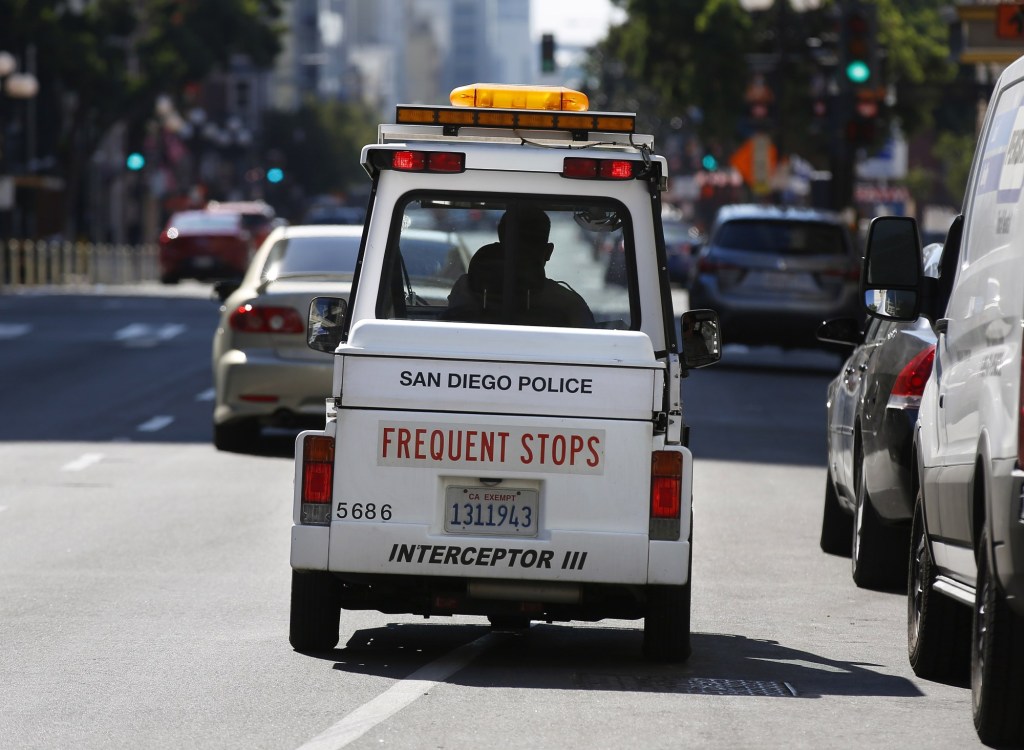San Diego city leaders want to stop towing vehicles with expired registrations, because having a vehicle taken away can have a devastating effect on college students and low-income people.
Registrations expired beyond six months are the No. 1 reason that San Diego police order vehicles towed, and a large percentage of those towed vehicles get sold at auction because the owners can’t pay the fines.
Frustrated by what some critics call “poverty tows,” the City Council’s public safety committee voted unanimously Wednesday to change the penalty for expired registrations from towing to a citation.
“When a first-generation college student drops out of school because the city took his car and sold it because the registration was overdue, it’s obvious that the system isn’t working,” Councilmember Stephen Whitburn said. “Year after year, this hurts thousands of our residents, primarily the poor.”
Whitburn stressed that the new policy, which needs final approval from the full council in coming weeks, would apply only to one type of violation: registrations expired beyond six months.
“This is narrowly written to apply only to overdue registrations, which we will continue to enforce, but with citations — not by taking and selling the cars of college students and low-income residents,” Whitburn said.
The new policy wouldn’t apply to tows ordered for violations of any other parking law, such as the 72-hour-maximum rule for street parking or the city’s oversized vehicle ordinance.
The new plan was prompted by a 2022 city audit that found the towing program has a “disproportionate impact” on low-income people.
An analysis of fiscal years 2017 through 2022 showed that more than 25,000 vehicles had been towed for registrations expired longer than six months, and that more than 12,000 of those vehicles were sold.
The next highest category of violation-prompting tows, violations of the 72-hour rule, led to fewer than half that number of tows.
New data since that audit suggest the trend has continued. The No. 1 towing violation in calendar year 2023 and the first 10 months of 2024 was expired registration, with 6,458 in 2023 and 5,423 from January through mid-October of last year.
The city’s independent budget analyst said the new policy could cost San Diego roughly $1.4 million in lost towing revenue. But the IBA said that number, which is based on the city’s revenue from tows in recent years, could end up being off the mark.
“The reason why the fiscal impact is difficult to estimate is that the potential revenue loss could be mitigated if vehicles that otherwise would have been towed for expired registrations over six months are nonetheless towed for an alternative violation,” said the IBA’s Baku Patel.
“If a majority of these vehicles do in fact get towed for other violations, the fiscal impact could be minimal,” Patel said. “Conversely, if most of these tows are successfully avoided, the fiscal impact would be more significant.”
Patel added that some of the lost revenue could be mitigated by increased citation revenue if people with expired registrations manage to come up with the money to pay their registration and the related city fines.
Councilmember Marni von Wilpert said the city should come up with a way to help such people by negotiating down the city citations they face or creating payment plans.
“People should be able to get out of a mountain of debt they couldn’t pay anyway,” von Wilpert said.
But she also stressed that the city can’t just let people stop registering their cars, contending that payment plans would help encourage people to keep their cars registered.
“We do have to enforce the rules,” said von Wilpert, noting that registration rules are the primary way the state gets people to have their vehicles smog-checked.
Whitburn expressed support for the payment plan idea.
Some local organizations that advocate for low-income residents lobbied for greater concessions, including the city agreeing not to report registration violations to the state Department of Motor Vehicles.
Chris Kennison, civic engagement organizer for Alliance San Diego, said the city should do everything it can to prevent towing from ruining people’s lives.
“This practice has long disproportionately harmed low-income San Diegans and communities of color,” he said.
Whitburn said the policy change on towing was a crucial move for the city and its most vulnerable residents.
“This will keep happening to low-income San Diegans unless we do something about it,” he said. “And it’s up to us to fix this injustice. It is a textbook case of a structural inequity: an institutional practice that perpetuates poverty.”
